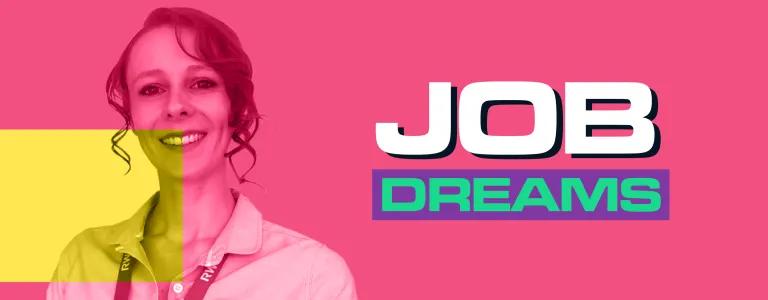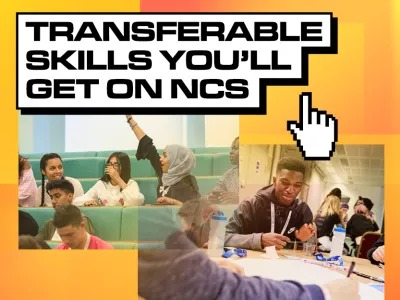
Job Dreams: Engineering Design Manager
Include this article in your Skills Builder Journal. It could help you develop...
As part of our Job Dreams series, we speak to professionals from different careers and share their advice with you. Last month, we found out what it’s like to be a social worker. This month we met Georgia, who let us know what it’s like to work in renewable energy…
What do you do?
Engineering Design Manager – Offshore Floating Wind for RWE Renewables
Can you tell us what your day-to-day is like?
Due to the broad scope of my role, usually every day is different. As with most jobs, there is a portion of the day spent giving guidance/steering/inputs/opinions via email, and there are usually a few Teams calls to discuss various topics. But digging down into tasks, I could spend my day:
- Coordinating teams of technical experts (e.g. Structures, Electrical, Wind Resource, Logistics, Turbine, O&M) to provide information to specific projects
- Giving guidance on optimisation of offshore floating projects (e.g. layout, foundation, fabrication & logistics, turbine choice etc…)
- Organising external studies into supply chain or technical investigations
- Work with local teams on the development strategy for specific markets
- Many other things…!
What do you love most about your job?
Knowing that I am working hard to help halt climate change. Climate change is one of the single biggest threats to our modern way of life, but as people in the Western world have not been too directly affected by it yet, many do not see the threat and are not willing to adjust their way of life. Developing countries are already experiencing negative effects, including droughts, food and water shortage and extreme weather events, and many are having to flee. It is only a matter of time before those issues start impacting western countries too.
What do you find most challenging?
As we work in a global business, meeting colleagues remotely across different time zones can pose challenges. But fundamentally what I find most challenging is the knowledge that some people still don’t care about climate change (or even don’t believe in it!) and oppose wind power. Fundamentally, people need electricity, and as the population grows and more people get access to technology, this demand will only increase. Electricity has to come from somewhere, and offshore wind offers a cheaper, reliable, flexible and efficient solution to this.
What did you see yourself doing when you were a kid?
Mainly a vet because I loved (and still love) animals and had lots of Animal Hospital toys. I became an Engineer almost by accident, luckily I did triple science at GCSE which then gave me access to the sciences at A-Level. I had a fantastic A-level chemistry teacher who inspired me to apply for Chemical Engineering at University, but I got one mark away from the grades to get in, so opted for Materials Engineering instead.
What challenges did you face in reaching where you are today?
I have been lucky that I haven’t faced too many challenges, and it’s important to recognise that I come from a privileged position (supportive parents, white, middle class, freedom & autonomy), whereas some do not. But if I had to mention some, I would say the first one was that doing triple science at GCSE wasn’t ‘cool’ for girls at the time. When I was at school, there were no initiatives to normalise and promote women in STEM like there is now. But I was never much good at more literature/essay based subjects anyway, so sciences and maths were a natural choice for me. There’s the occasional misogynistic ‘joke’ or comment to navigate, luckily rarely at work but still prevalent in the general population, and I have had a few experiences of people assuming I am a PA/admin assistant and not an Engineer. They are respectable careers in themselves, but is just not what I do! You just have to be confident, advocate for yourself and navigate how people treat you.
When I did my University yearlong industrial placement, I was very keen to learn and develop myself, so tried to get involved in as much as possible, branch out to the wider business and suggest positive changes. I found that some people were not so happy with this change of status quo, and wanted me to almost ‘stay in my lane’. This was disheartening and I never fully understood why this was. If I was male, would they have seen me as ambitious, but because I was female, was I seen as overstepping? Ultimately, I learnt not to care about people who try and put you down, and if you want to do something that will be beneficial for you, just go for it. The extra work I got involved in actually taught me so much, and I believe the experience helped me in securing my graduate scheme.
I didn’t face this challenge so much, but I foresee a potential future blocker for some students who don’t want to attend University due to the rising fees and high interest rates causing spiralling debt. This is a key risk for essential subjects like Engineering, Medicine and Nursing, and could create a real shortage of key qualifications that the UK needs to be successful, sustainable and safe.
Where do you see yourself going next?
I have found that good career opportunities do present themselves when you put yourself out there and build your reputation, in this sense I am taking a ‘go with the flow’ approach as not to constrain myself to a specific path. But I would love to spend some time abroad in a developing offshore floating wind market. Engineering has given me a fantastic start in my career, but ultimately I believe my strengths lie in strategic development activities. Outside of RWE and Engineering, I also have a passion for social topics and activism, so I would like to develop more in this area.
What do you know now that you wish you’d known when you first left school?
It doesn’t matter what people think of you, as long as you are a good person and don’t harm people/your environment. Don’t bother trying to be cool, find a group of friends that make you feel good about yourself and support you. Also, make the most of your time at University. Go out, get involved, have fun and appreciate the good times when you are in them.
What advice would you give to someone interested in joining your industry?
Make sure you are passionate about the cause, come in with enthusiasm and confidence to change things for the better. There’s lots to do and we need motivated people to achieve it.
Do you think women are underrepresented in engineering roles? If so, why do you think that is and how could this change?
Yes, but I don’t think this is a problem within Engineering careers themselves, but more the perception of Engineering among school/college pupils. Many don’t know about the career path it offers and don’t know how broad and flexible it is. Because of this, girls may be reluctant to go into careers that they are uncertain about. I also would assume they are less likely to be pushed into these types of careers by family, as they might have outdated assumptions about the industry. Slowly, attitudes are changing, but we just need to keep working on promoting STEM to young people.
This is not just a problem for Engineering but for women’s careers as a whole. The parental leave policies and childcare cost support in the UK are poor compared to our European neighbours, and as women are still seen as primary caregivers and generally earn less than men, are much more likely to leave their careers to stay home with children. During this time, women miss out on development opportunities. This needs to change at a fundamental governmental level to support the progression of women in all fields. I recommend the book ‘The Motherhood Penalty’ by Joeli Brearley, and her organisation ‘Pregnant then Screwed’.
What’s the best piece of professional advice you’ve been given?
Just get involved, dive in, say yes (within calculated reason…!), don’t get bogged down by details/perfection and focus on the bigger picture.
What quote do you live by?
You miss 100% of the shots you don’t take 😉



